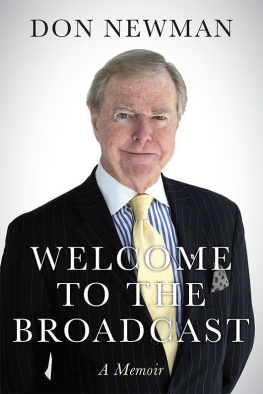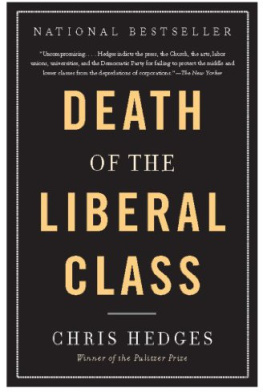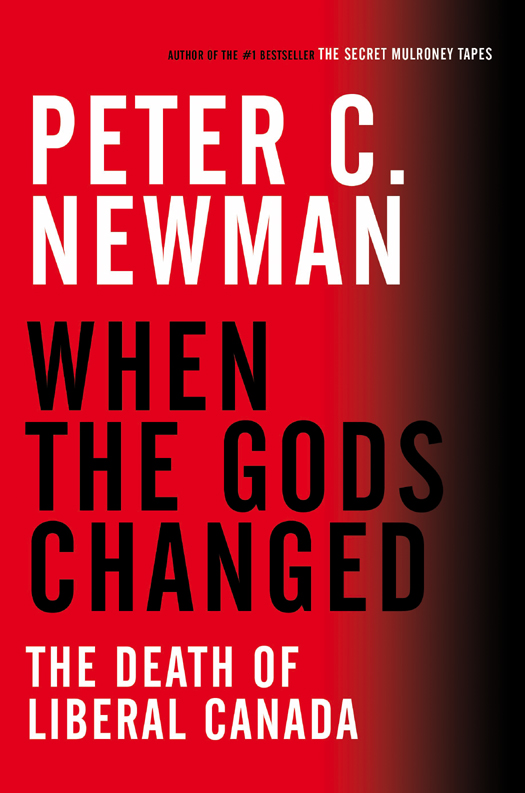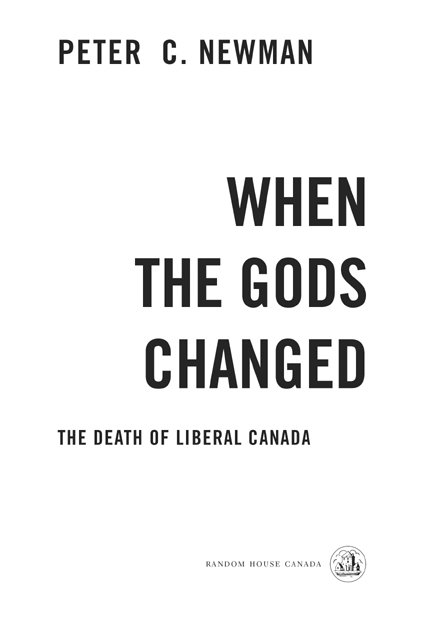SELECTED BOOKS BY PETER C. NEWMAN
Renegade in Power: The Diefenbaker Years
The Distemper of Our Times: Canadian Politics in Transition
Home Country: People, Places, and Power Politics
Bronfman Dynasty: The Rothschilds of the New World
The Canadian Establishment, Volume 1: The Old Order
The Canadian Establishment, Volume 2: The Acquisitors
The Establishment Man: Conrad Black, a Portrait of Power
Company of Adventurers: Volume I of the Unauthorized History
of the Hudsons Bay Company
Caesars of the Wilderness: Volume II of the Unauthorized History
of the Hudsons Bay Company
Empire of the Bay: An Illustrated History of the Hudsons Bay Company
Merchant Princes: Volume III of the Unauthorized History
of the Hudsons Bay Company
The Canadian Establishment, Volume 3: Titans
Here Be Dragons: Telling Tales of People, Passion and Power
The Secret Mulroney Tapes: Unguarded Confessions of a Prime Minister
Izzy: The Passionate Life and Turbulent Times of Izzy Asper,
Canadas Media Mogul
PUBLISHED BY RANDOM HOUSE CANADA
COPYRIGHT 2011 dragonmaster productions ltd.
All rights reserved under International and Pan-American Copyright Conventions. No part of this book may be reproduced in any form or by any electronic or mechanical means, including information storage and retrieval systems, without permission in writing from the publisher, except by a reviewer, who may quote brief passages in a review. Published in 2011 by Random House Canada, a division of Random House of Canada Limited, Toronto. Distributed in Canada by Random House of Canada Limited.
www.randomhouse.ca
Random House Canada and colophon are registered trademarks.
LIBRARY AND ARCHIVES CANADA CATALOGUING IN PUBLICATION
Newman, Peter C., 1929
When the gods changed : the death of Liberal Canada / Peter C. Newman.
eISBN: 978-0-307-35828-8
1. Liberal Party of CanadaHistory. 2. CanadaPolitics and government2006. I. Title.
JL197.L5N49 2011 324.27106 C2011-906026-4
Design by CS Richardson
v3.1
This book is for DOUGLAS BEARDSLEY.
Best friend.
Enlightening Holocaust poet.
Fellow jazz drummer and Mulligan groupie.
Equatorial explorer.
Keeper of my conscience.
We tell ourselves stories in order to live
I am a child of the century,
a child of disbelief and doubt,
and will remain so until the grave.
How much terrible torture this thirst
for faith has cost me,
which is all the stronger in my soul,
the more arguments I can find against it.
FYODOR DOSTOYEVSKY
CONTENTS
Interview Excerpt: Ignatieff on leaving teaching
and going into politics
Interview Excerpt: Ignatieff on Canada
and Harper
IT WAS AN APPARENTLY INNOCENT MOMENT , but it revealed more about Michael Ignatieffs fate than his million (or so it seemed) personal appearances over the half decade since hed first shown up on Canadas political radar. He had landed like a brick thrown through a stained glass window, abruptly assuming the mantles of Laurier, Mackenzie King, St. Laurent, Pearson and Trudeau as leader of the Liberal (read Government) party. But instead of inheriting their thrones, he turned out to be an enemy of promisethe crown prince who was never to inherit the kingdom.
Fortunately, there was an Ottawa-based New York Times correspondent on the spot to record the chilly occasion of that chilly late winter afternoon in 2011 when this harsh verdict was confirmed. Michael Ignatieff may have written 17 books, gained some fame on British television as a serious thinker and led a human rights center at Harvardbut all that appeared to count for little when he laced up his skates and headed out on the 19th-century canal this city uses as a giant ice rink, reported Ian Austen in the newspapers March 11 edition. As he skated through a bitter wind with ten children and a gaggle of adults for a photo opportunity, no one approached him or even waved. In a random sampling, few of the skaters that day even knew his name.
This incidence of non-recognition did not happen in Red Deer, Alberta, or in Amherst, Nova Scotia, but in the nations capital, within sight and sound of the Parliament buildings. And this did not happen on some insignificant, lazy Wednesday afternoon. It happened on a hectic Sunday during the run-up to the general election of 2011, which turned Canadian politics upside down and inside out.
Ottawa is a company town.
Liberals invented the franchise.
It just expired.
Introduction: The Enemy of Promise
Despite Michael Ignatieffs best effortsand at times he was unexpectedly impressivewhen the 2011 election was called, the Grits were already dying.
THIS BOOK HAS TWO PURPOSES . The first is to reconstruct the Liberal partys Ferris-wheel experience under the stewardship of Michael Ignatieff, who was on watch for the brief revival of its hopes and its stunning crash to earth. His reign was compelling in its Wagnerian symmetry. His genuine dedication to the partys rebirth was offset by its state of disrepair, and the self-satisfied hibernation of its previous leaders. His failure was more a symptom of their careless stewardship than his doingbut try as he might, he could not halt the partys disintegration.
My second purpose is to reconstruct the nation-building significance of the Grits in Canadian history, starting with their founding saint, Sir Wilfrid Laurier. He picked up the torch originally lit by reformers such as the shy and introspective Toronto lawyer Robert Baldwin, who sat in the Assembly of Upper Canada for only one year but became an ardent crusader for responsible government. Baldwin influenced the visiting Lord Durham, eventually became co-premier of the newly united province of Canada (todays Ontario and Quebec), founded the University of Toronto and reformed the judiciary. The alliance he established with Canada Easts liberal reformer Louis-Hippolyte LaFontaine made them, in effect if not in name, the countrys first prime ministers. As well as popularizing the notion of responsible government, LaFontaine and Baldwin were the founding proponents of a bicultural nation. Today, few remember their names or mark their achievements.
The demise of the Liberals, if it comes, will be nothing to celebrate. We have a polarized, two-party system to the south, an example to be avoided by anyone in search of relatively civil and efficient governance. Much will be lost if this ship goes down. But the unsteady hands at the helm have been those of the Grits themselves. This mlange of tragedy and inevitability reflects the current of eventsthe partys shining legends and hard truths on the one hand, and its most recent leaders descent into hell on the other. The two strands cannot be separated, even by those who wish to evade responsibility for the partys electoral collapse by doing the easiest thing: blaming Ignatieff. In the pages that follow, readers will taste the raw facts.
Ignatieff holds the narrative arc in place, but the book is less about him than about the looming disappearance of the Liberal party. Here was a man who had publicly blessed the worst of George W. Bushs extra-territorialism, yet was also endowed with passionate love for his home countryas he frequently demonstrated on his 2010 bus tour and his 2011 election town-hall rallies. Every evening, right to the bitter end of the campaign, he displayed aspects of the humanitarianism and intellectualism for its own sake that we had so (rightly) admired in Trudeau. Ignatieff was an evocative writer, a trafficker in ideas; his intimate personal experience with Iraqs gassing of the Kurds neatly paralleled Trudeaus adventures during Quebecs asbestos strike and his cohabiting with Central Asia tribesmen.









